The Neutrality Acts were a series of acts passed by the US Congress in the 1930s in response to the growing threats and wars that led to World War II. They were spurred by the growth in isolationism and non-interventionism in the US following the US joining World War I, and they sought to ensure that the US would not become entangled again in foreign conflicts.
Abscam was an FBI sting operation in the late 1970s and early 1980s that led to the convictions of seven members of the United States Congress, among others, for bribery and corruption. The two-year investigation initially targeted trafficking in stolen property and corruption of prominent businessmen, but later evolved into a public corruption investigation. The FBI was aided by the Justice Department and a convicted con-man, Mel Weinberg, in videotaping politicians accepting bribes from a fictitious Arabian company in return for various political favors.
The 1973 oil crisis or first oil crisis began in October 1973 when the members of the Organization of Arab Petroleum Exporting Countries led by Saudi Arabia proclaimed an oil embargo. The embargo was targeted at nations that had supported Israel during the Yom Kippur War. The initial nations targeted were Canada, Japan, the Netherlands, the United Kingdom and the United States with the embargo also later extended to Portugal, Rhodesia and South Africa. By the end of the embargo in March 1974, the price of oil had risen nearly 300%, from US$3 per barrel ($19/m3) to nearly $12 per barrel ($75/m3) globally; US prices were significantly higher. The embargo caused an oil crisis, or "shock", with many short- and long-term effects on global politics and the global economy. It was later called the "first oil shock", followed by the 1979 oil crisis, termed the "second oil shock".

Economic sanctions are commercial and financial penalties applied by one or more countries against a targeted self-governing state, group, or individual. Economic sanctions are not necessarily imposed because of economic circumstances—they may also be imposed for a variety of political, military, and social issues. Economic sanctions can be used for achieving domestic and international purposes.
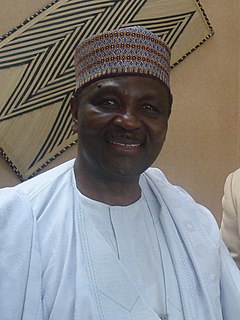
Yakubu Gowon, affectionately known as Jack Gowon, is a retired Nigerian Army general and military leader. As Head of State of Nigeria, Gowon presided over a controversial Nigerian Civil War and delivered the famous "no victor, no vanquished" speech at the war's end in an effort to promote healing and reconciliation. The Nigerian Civil War is listed as one of the deadliest in modern history, with some accusing Gowon of crimes against humanity and genocide. Gowon maintains that he committed no wrongdoing during the war and that his leadership saved the country.
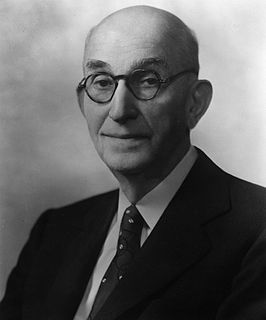
Carl Trumbull Hayden was an American politician. Representing Arizona in the United States Senate from 1927 to 1969, he was the first U.S. Senator to serve seven terms. Serving as the state's first Representative for eight terms before entering the Senate, Hayden set the record as the longest-serving member of the United States Congress more than a decade before his retirement from politics. He was Dean of the United States Senate and served as its president pro tempore and chairman of both its Rules and Administration and Appropriations committees. He was a member of the Democratic Party.

The United States embargo against Cuba prevents American businesses, and businesses organized under US law or majority-owned by citizens of the United States, from conducting trade with Cuban interests. It is the most enduring trade embargo in modern history. The US first imposed an embargo on the sale of arms to Cuba on March 14, 1958, during the Fulgencio Batista regime. Again on October 19, 1960, almost two years after the Cuban Revolution had led to the deposition of the Batista regime, the US placed an embargo on exports to Cuba except for food and medicine after Cuba nationalized the US-owned Cuban oil refineries without compensation. On February 7, 1962, the embargo was extended to include almost all exports. The United Nations General Assembly has passed a resolution every year since 1992 demanding the end of the US economic embargo on Cuba, with the US and Israel being the only nations to consistently vote against the resolutions.

Samuel Pearson Goddard Jr. was the 12th governor of Arizona, serving from 1965 until 1967. He remained active in politics following his term in office, serving on the Democratic National Committee and as chairman of the Arizona Democratic State Committee.
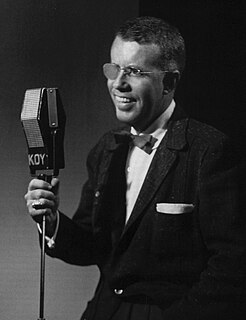
John Richard "Jack" Williams was an American radio announcer and politician. After gaining public recognition throughout Arizona because of his work in radio, he went on to become a two-term mayor of Phoenix, Arizona, and a three-term governor of Arizona. A constitutional amendment, approved by Arizona voters in 1968, resulted in Williams serving eight years as governor and being the first governor of Arizona to serve a four-year term.
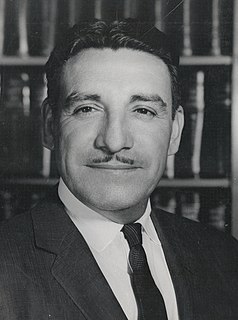
Raúl Héctor Castro was a Mexican American politician, diplomat and judge. In 1964, Castro was selected to be U.S. Ambassador to El Salvador, a position he held until 1968 when he was appointed U.S. Ambassador to Bolivia. In 1974, Castro was elected to serve as the 14th governor of Arizona, and resigned two years into his term to become U.S. Ambassador to Argentina. Prior to his entry into public service, Castro was a lawyer and a judge for Pima County, Arizona. He was a member of the Democratic Party.

William Scott "Jack" Elam was an American film and television actor best known for his numerous roles as villains in Western films, and later in his career, comedies. His most distinguishing physical quality was his misaligned eye. Before his career in acting, he took several jobs in finance and served two years in the United States Navy during World War II.
The Organization of Arab Petroleum Exporting Countries (OAPEC) is a multi-governmental organization headquartered in Kuwait which coordinates energy policies among oil-producing Arab nations. OAPEC's primary objective is safeguarding the cooperation of numerous members in various aspects of economic activity within the oil industry as well as maintaining strong relations among themselves; to provide legitimate means to preserve the members' individual and collective efforts within the industry; unite on-going efforts for the procurement of oil; provide access to consumer markets on fair and reasonable terms; and provide conditions, adequate capital, and experience of investors in the oil industry.
John Myers Myers was an American writer. He is known best for the fantasy novel Silverlock (1949), in which a man with a Master of Business Administration travels through a fantasy land, meeting dozens of characters from myth, legend, and romance for adventure and instruction.
Miss Arizona USA is the beauty pageant that selects the representative for the state of Arizona in the Miss USA pageant, and the name of the title held by its winner. The pageant is directed by Casting Crown Productions.

Mark D. Myers is an American geologist who served as the fourteenth Director of the U.S. Geological Survey (USGS). He was nominated by President George W. Bush on May 3, 2006, confirmed by the U.S. Senate, and sworn in September 26, 2006. Dr. Myers replaced prior director Charles G. Groat, who had resigned effective June 17, 2005.

Charles Clyde Bowden was an American non-fiction author, journalist and essayist based in Las Cruces, New Mexico.
The 1967 Oil Embargo began on June 6, 1967, the second day of the Six-Day War, with a joint Arab decision to deter any countries from supporting Israel militarily. Several Middle Eastern countries eventually limited their oil shipments, some embargoing only the United States and the United Kingdom, while others placed a total ban on oil exports. The Oil Embargo did not significantly decrease the amount of oil available in the United States or any affected European countries, due mainly to a lack of solidarity and uniformity in embargoing specific countries. The embargo was effectively ended on September 1 with the issuance of the Khartoum Resolution.
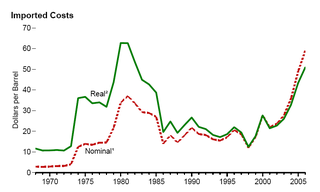
The 1970s energy crisis occurred when the Western world, particularly the United States, Canada, Western Europe, Australia, and New Zealand, faced substantial petroleum shortages as well as elevated prices. The two worst crises of this period were the 1973 oil crisis and the 1979 energy crisis, when the Yom Kippur War and the Iranian Revolution triggered interruptions in Middle Eastern oil exports.

United States gubernatorial elections were held on November 8, 1966, in 35 states. 12 Democrats and 23 Republicans won election, bringing the partisan reflection of the nation's states to 25 Democrats and 25 Republicans. This election coincided with the Senate and the House elections.

The 28th Arizona State Legislature, consisting of the Arizona State Senate and the Arizona House of Representatives, was constituted in Phoenix from January 1, 1967 to December 31, 1968, during Jack Williams' first term as Governor of Arizona. The make-up of both houses was changed drastically by the implementation of districts, rather than the old system of county representation. The fourteen counties were broken up into 8 districts. Four of the districts consisted of multiple counties, while the other four represented single counties. In addition, Districts Seven and Eight, representing Pima and Maricopa Counties respectively, were further broken down into sub-districts. District 7 had eight sub-districts, 7-A through 7-F, while District 8 had fifteen sub-districts, 8-A through 8-O. The number of senators increased to 30, with the balance of power shifting drastically. Where Democrats had held a 26–2 majority in the prior legislature, Republicans now held a slim 16-14 majority. While the number of senators increased, the number of representatives decreased from 80 to 60. Again, the balance of power shifted to the Republicans, who now held 33-27 majority in the lower house. It was the first time Arizona history where the Republicans won control of both houses of the legislature.












